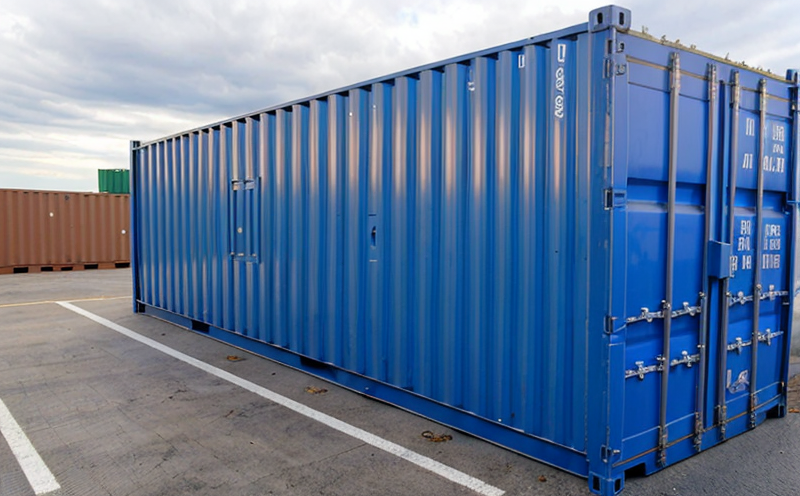EN ISO 15380 Biodegradable Plastic Storage Testing
The EN ISO 15380 standard specifies methods for determining the biodegradability of plastics in anoxic conditions, which is particularly relevant for storage containers made from biodegradable polymers. This testing is crucial for ensuring that packaging materials and storage containers comply with environmental sustainability requirements.
Biodegradable plastics are designed to degrade under certain conditions, primarily through the action of microorganisms such as bacteria or fungi in a composting environment. However, when these materials find their way into waste streams intended for landfill, it is important to ensure that they do not remain intact and continue to contribute to long-term environmental pollution.
The test procedure outlined in EN ISO 15380 involves exposing the plastic sample under controlled anoxic conditions (absence of oxygen) to a defined inoculum. The inoculum consists of microorganisms capable of degrading the polymer. Over time, changes in the weight or mass loss are monitored as indicators of biodegradation. This method helps determine if the material meets specific biodegradability criteria set by this standard.
The importance of this testing cannot be overstated, especially for industries involved with packaging and storage solutions designed to minimize environmental impact. Compliance with EN ISO 15380 ensures that manufacturers can confidently market their products as environmentally friendly while also meeting regulatory requirements.
| Parameter | Description |
|---|---|
| Sample Preparation | Standardized cutting of samples to a specified size and weight. |
| Inoculum Type | Aerobic or anaerobic microorganisms selected based on the test conditions. |
| Temperature and Humidity Control | Tested under controlled environmental conditions to simulate real-world use scenarios. |
| Weighing Frequency | Regular weighing intervals throughout the test duration for accurate mass loss measurement. |
The testing process is meticulously designed to ensure that results accurately reflect the biodegradability potential of storage containers made from biodegradable plastics. By adhering strictly to EN ISO 15380, laboratories like Eurolab can provide reliable data that supports sustainable product development and compliance initiatives.
| Criteria | Description |
|---|---|
| Weight Loss | The sample must exhibit a minimum percentage weight loss within specified timeframes. |
| Microbial Activity | Microbial populations must demonstrate significant activity conducive to biodegradation. |
| Eco-friendly Claims | The results must support the manufacturer's eco-friendly claims and comply with relevant standards. |
In conclusion, EN ISO 15380 provides a robust framework for assessing the biodegradability of storage containers made from biodegradable plastics. It is an essential tool in promoting sustainable practices within the packaging and storage industries.
Eurolab Advantages
At Eurolab, we pride ourselves on delivering accurate, reliable, and compliant testing services tailored to meet your specific needs. Our team of experts ensures that every test conducted adheres strictly to international standards such as EN ISO 15380.
We offer a range of additional benefits beyond just compliance with this standard:
- Comprehensive Consultation Services
- State-of-the-Art Laboratory Facilities
- Experienced and Certified Testing Personnel
- Prompt Turnaround Times for Test Results
- Customized Reporting Solutions
Our clients benefit from our holistic approach to testing, which includes not only the mechanical performance of storage containers but also their environmental impact. By partnering with Eurolab, you can be assured that your products meet stringent quality and safety standards.
Competitive Advantage and Market Impact
Incorporating EN ISO 15380 compliance into product development strategies offers significant competitive advantages. It positions brands as leaders in sustainability, attracting environmentally conscious consumers and stakeholders.
Compliance with this standard can also open doors to new markets where regulations favor eco-friendly products. For instance, many regions are implementing stricter environmental policies that require manufacturers to demonstrate biodegradability of their packaging materials.
Moreover, successful EN ISO 15380 certification enhances brand reputation and customer trust, fostering long-term relationships with both consumers and suppliers. This can lead to increased market share and profitability.
Use Cases and Application Examples
| Application | Description |
|---|---|
| Paper and Board Packaging | Determining the biodegradability of paperboard containers designed for food storage. |
| Plastic Bottles | Assessing the degradation rate of biodegradable plastic bottles in landfill conditions. |
| Pallet Wraps | Evaluating the environmental impact of pallet wraps used in logistics and transport. |
The data obtained from EN ISO 15380 testing can be instrumental in refining product designs, optimizing production processes, and ensuring regulatory compliance. These tests are particularly valuable for R&D teams looking to innovate within the sustainable packaging space.
For example, a company developing biodegradable plastic storage containers may use these tests to validate their claims about the environmental benefits of their products. Similarly, procurement departments can leverage this information to select suppliers who meet stringent sustainability criteria.





